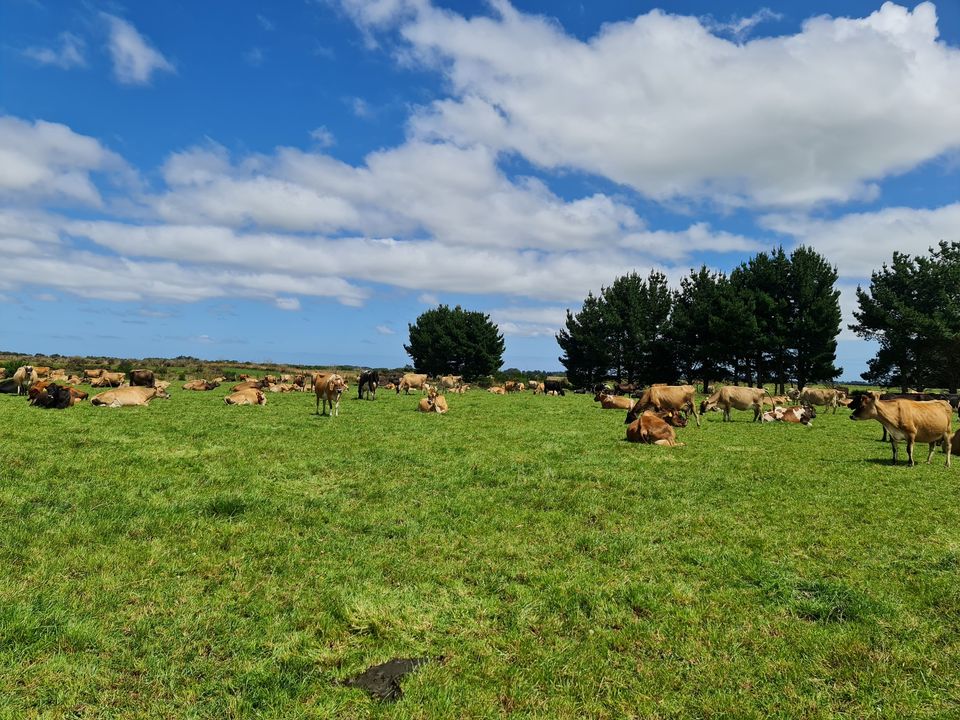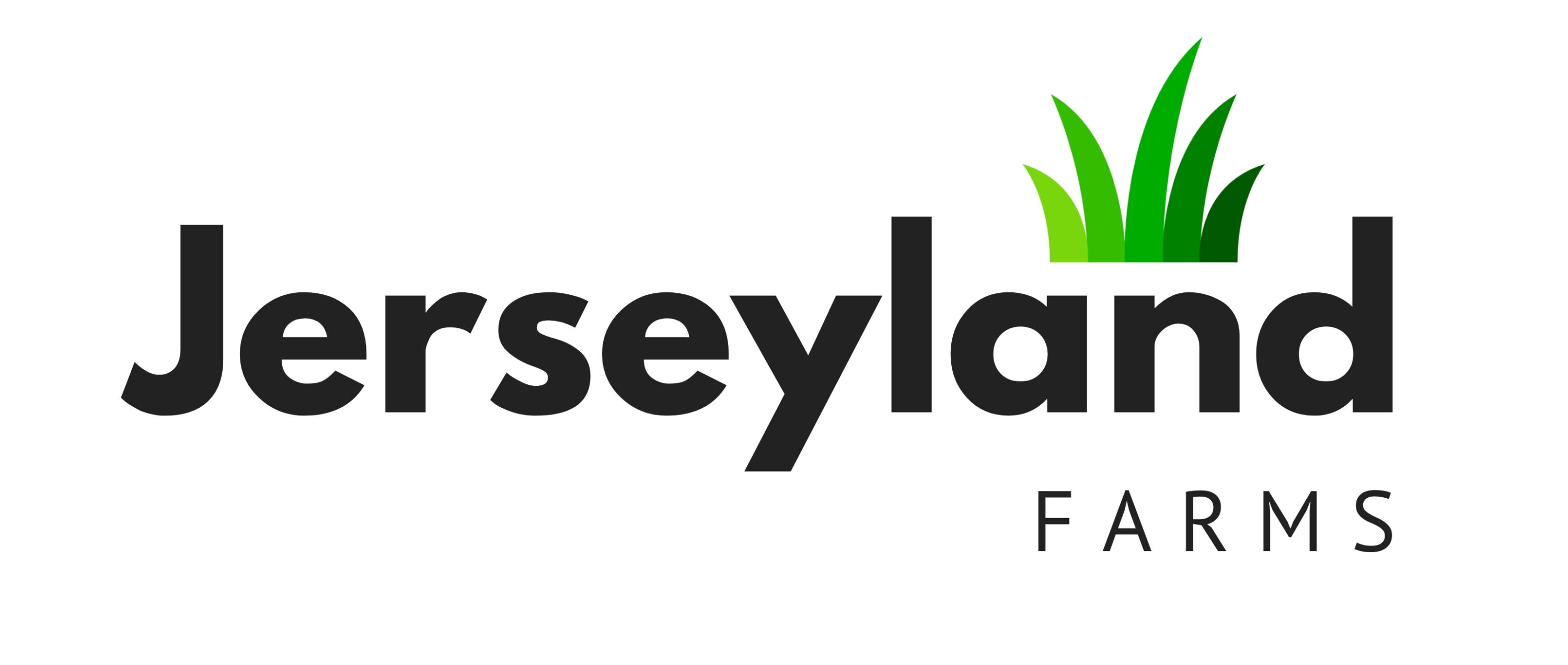
Make sure to follow Jerseyland Farms on Facebook
August 2025
Progress for Jerseyland Farm since the last report has been particularly good, with a much-awaited re-development programme completed, a renewal of Dyllan and Rachel’s contract and cows wintered and back on farm in excellent condition. As reporting back to members about the farm has been reduced due to time commitments, I will endeavour to cover as much as possible in this report.
2024/25 Season
The season finished well, with May production 56 percent ahead of the year before. This wasn’t enough to make up for the shortfall in spring but set the farm and cows up very well – with cows in condition score 4.5 to 5. The final production was 219,743 kgMS. Still well short of the 240,000 kgMS target, but up from the previous year of 216,190 kgMS.
A major project was undertaken to restore part of the peat block from gorse and ragwort to productive pasture. This is an area of approximately eight hectares. We have re-grassed the area as well as improved the drainage, installed new culverts and fences. The weeds will take some controlling, but well managed, this area will help improve the farms productivity.
The team on farm have been fixing areas of the farm that were damaged by the flooding and wet conditions occurring during last spring.
The investment in extra feed purchased through the wet spring has paid off with the empty rate being around 9%, with a reduced calving interval as well.
The JLF board now includes Evan Smeath, who has replaced Mark Townshend. Evan’s suggestion of incentives for our contract milkers has been taken on board, with the new contract providing financial rewards for milk quality, records, calf rearing and cow wastage.
We also farewelled Tim Dawkins, as he has moved to Marlborough. Pete is back as supervisor.
The new season has started very well, with decisions made to blanket dry cow the herd, and teat seal the heifers paying off with very little mastitis. The wet conditions last season, combined with milking plant issues caused a lot of problems for the staff on farm. It was a credit to them that they got through – it was an incredibly stressful season for the whole of the Southland area.
The financial statements for the year are still to be received. With the higher payout we would have hoped to have provided a higher rate of return for our investors, but the cost of purchased feed and an unexpected cost of milking plant has meant a return similar to the 23/24 season. Alongside these additional costs was the requirement to purchase Fonterra shares. As with all farming operations – spending to mitigate higher losses has paid off – as we look forward to a better season in 25/26.
Within the budget for this season is a roof replacement for the main dwelling. We have also completed repairs on the calf sheds and improved the cattle tracks.
Overall, the farm is set up well to achieve our targeted production of 240,000 kgMS.
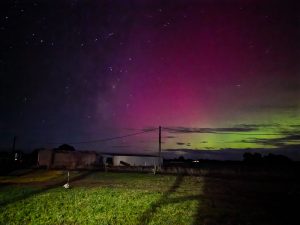
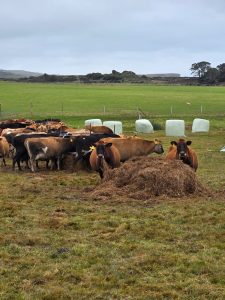
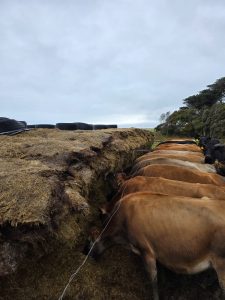
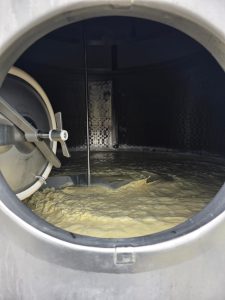
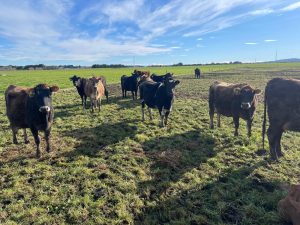
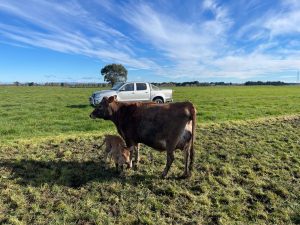
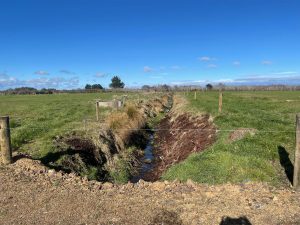
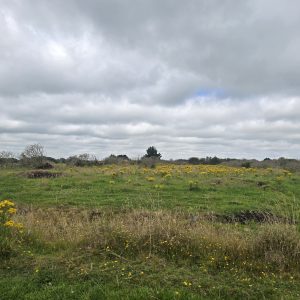
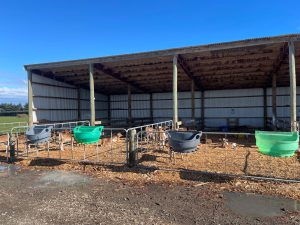
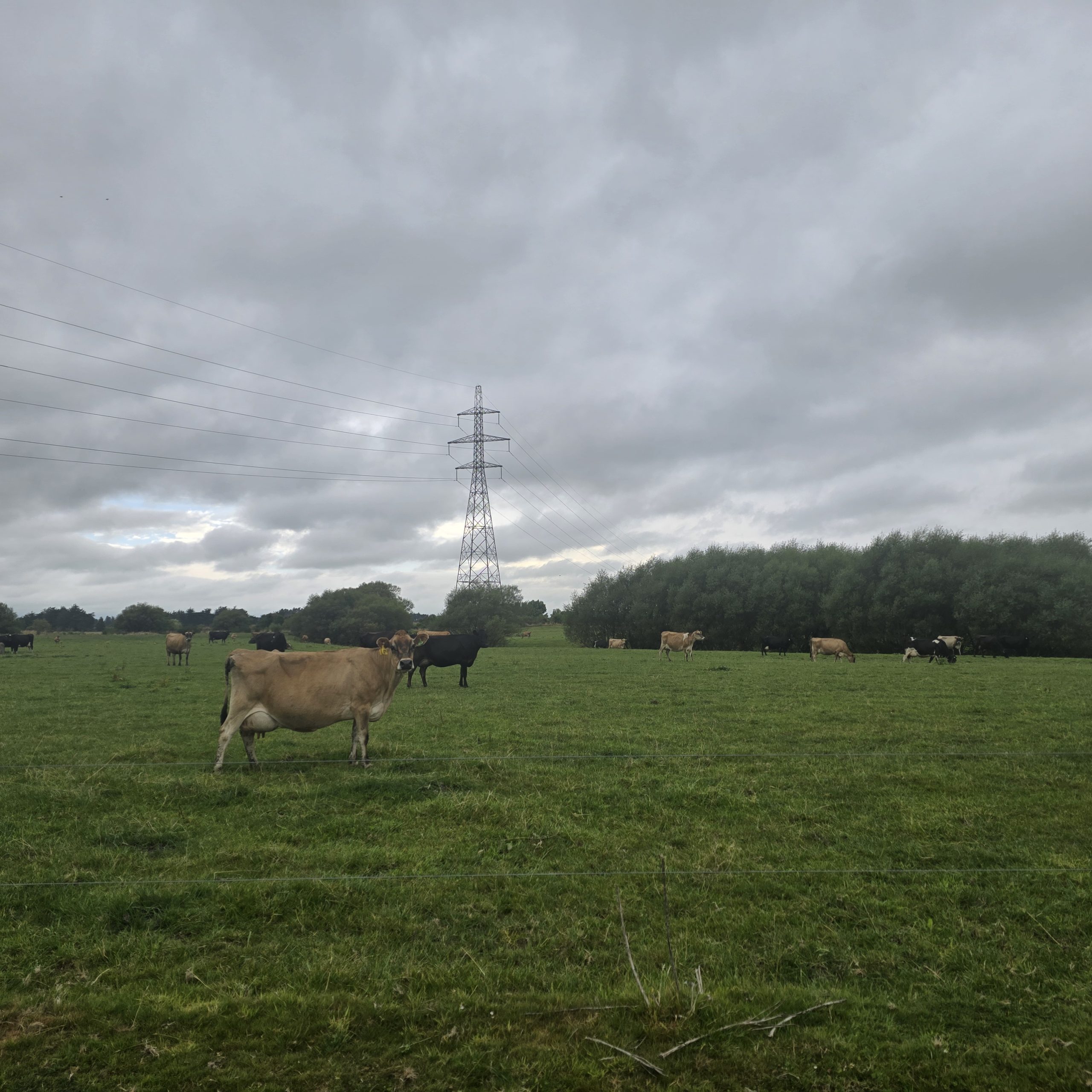
March 2025
After a very hard spring, the focus for the Jerseyland Farms management team has been to make the most of the remaining season. Production on a daily basis is currently at a similar level to this time last year.
This is the fourth season for the farm we had set the farm up to achieve 240,000 kgMS, which is the target each year. The cows and farm were looking good, but the relentless rain took its toll. Dyllan and Rachel and their staff did very well – keeping a positive attitude despite the challenges. We are currently on target for around 220,000 kgMS from 640 cows wintered. This will be a slight increase on last year.
Not only was the weather a challenge, but the milking plant had reached the end of its capabilities. Whilst unbudgeted the replacement of the vacuum plant was necessary, and the replacement should see issues with high SCC alleviated. It’s fair to say that the higher payout received so far this year has helped soften the cashflow impacts of this extra cost.
Winter grazing has been secured for the herd for the winter, along with baled silage for the farm crops once the cows return from grazing.
Maintenance over the winter will include some work on homes and sheds. The work done on the races last year has made a big difference to the farm operation. The herd is becoming more Jersey quite quickly. Dyllan and Rachel have been impressed with the herd – with the cows being hardier than they expected, and a lot easier to keep fed than other breeds they’ve farmed.
Farm supervisor Tim Dawkins has been concentrating ensuring the young stock growth is maintained.
November 2024
It’s been an incredibly tough calving period for farmers in Otago and Southland. The good autumn and winter meant wetter than normal soil conditions. Relentless rain through September and October has and continues to mean conditions not experienced in most farmer’s lifetimes.
In the June Focus I reported that the season had been set up well – with good cow condition and pasture cover. This helped through the early stages of the season, with production well on target for the 240,000 kgMS budgeted, and 40 percent above last year. The farm is still up year to date – 9000 kgMS, but is currently 6 percent behind October last year.
Tim Dawkins has provided invaluable support for Rachel and Dyllan. Despite the challenges, those on farm are remaining optimistic, and have been proactive in looking for solutions. An abundance of balage in the Southland region has helped – with Jerseyland Farms purchasing 500 bales to keep cows fed. Palm Kernal has also been purchased.
Looking forward, the focus moves to getting cows back in calf. Cow condition is below optimum, but cow intakes are increasing as pasture utilisation improves with better weather. The decision to start AB a couple of days earlier than planned will help maintain the mean calving date.
Full credit must go to the team on farm. The flood last year was a major upset at the time, but they have faced even tougher conditions this year, not only due to weather, but also with vacuum issues in the shed, which should be resolved now, but have been incredibly frustrating.
The Board is currently working through the decision of the Gibson family to sell their investment. This is being resolved by a transfer to the remaining partners of the 10% interest and 120 shares. We are also required to meet Fonterra’s share standard with some shares purchased to date.
In early November Rodney Dobson, Tim and I will look over the farm to assess and pasture damage and look at options to improve the on-farm situation. No doubt the weather will play the biggest part, but being able to show support to the on-farm team is a priority.
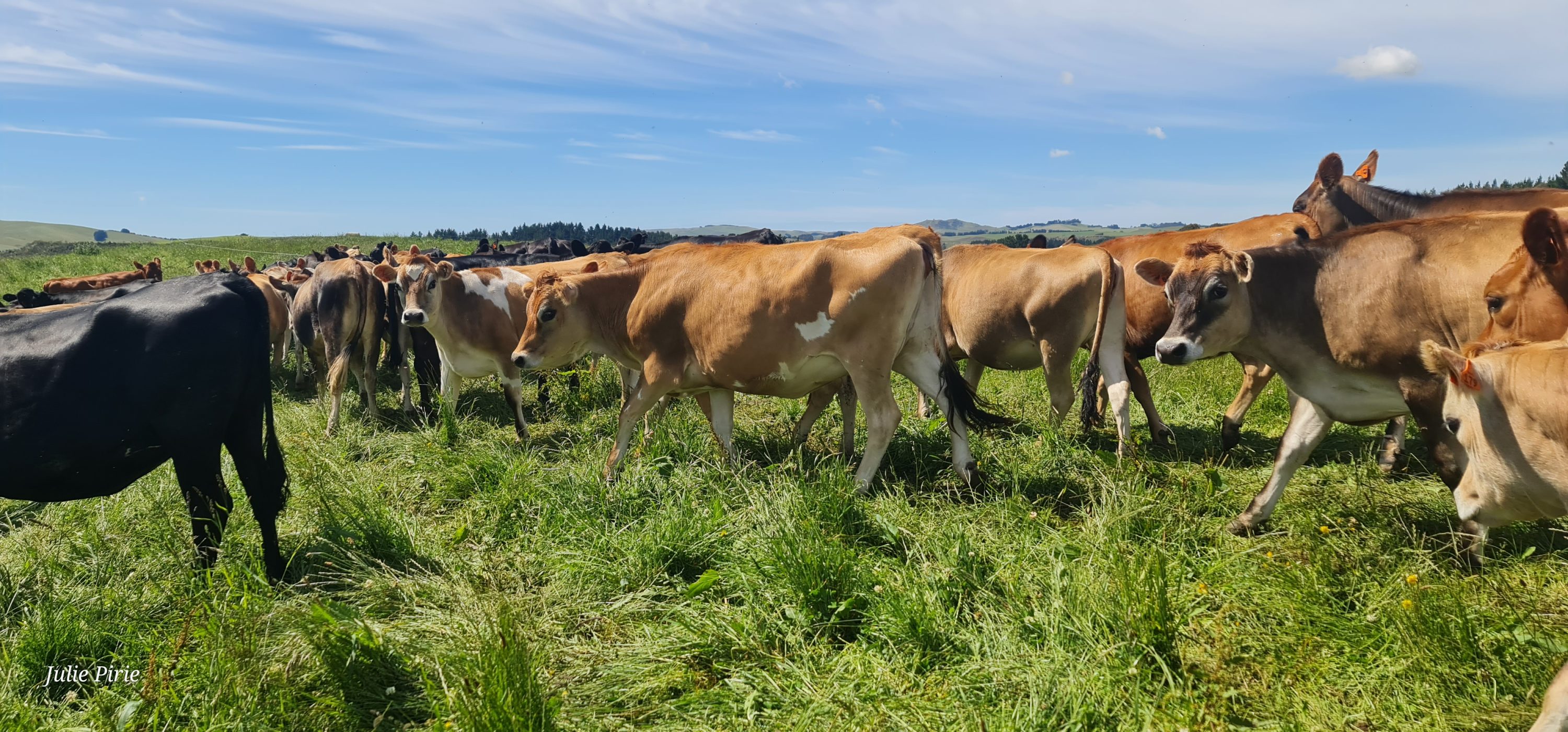
June 2024
The end of the season for Jerseyland Farms comes with a fair bit of relief. As noted in the last Jersey Focus there were some rough times during the spring. It’s pleasing to report things have ended up a lot better.
I have somehow managed to coincide visits to Southland with exceptionally good weather. It was quite a shock to experience a dose of cooler weather on my last visit on 11 April. Despite the weather, the farm was looking great, with very good pasture cover and growth. The cooler weather was a good reminder that cow condition is an important factor to consider for next season, which will be a focus for the drying off.
The farm was 7,350 kgMS behind the previous season in September 2023, this has reduced to 3,770 kgMS following a very good autumn. Drying off decisions will be based on cow condition as pasture cover and supplements on hand is on target. It does highlight the well versed saying that it’s difficult to make up for lost production in the spring.
As the focus moves to the next season, there will be some maintenance on farm. The flooding and wet autumn has meant farm tracks are in need of work, weed control through spraying and some flood damaged fencing are all part of the plan to attend to while the cows are out at winter grazing.
The Board has purchased cows over the season, this will allow us to make more voluntary decisions on selling cows that for various reasons need to be replaced.
Rising interest rates and costs, along with purchasing cows have eaten into profits this year, however, the farm has been able to match last seasons return to investors.
The herd is turning gold very quickly, which will mean milking a few extra numbers next season. The aim is around 640 cows milking, with 240,000 kgMS the target.
There has been a change in the social media reporting – Rachel is adding content to Facebook as time permits straight from the farm – so search Facebook for Jerseyland Farms, and follow on-line.
5 April 2023
During the JerseyNZ Annual Conference held in Invercargill last week, we had the opportunity to visit Jerseyland Farms. The weather was in our favour (although we kept being told it’s always like that!) It was a brilliant day with a BBQ lunch, followed by a walk through the herd. It was fantastic to see such a well-managed farm and having the opportunity to get up close to the herd. Our thanks go to Pete Atkin, Rachel Jackson and Dylan Geerlings for ensuring the farm was looking good and clearing out the sheds for the lunch. We also thank Farm Source for sponsoring the BBQ lunch, DairyNZ for providing the tables and chairs and to the Southland Jersey Club for assisting with the BBQ.
The video below is courtesy of Country & Co – also sponsors of our Conference this year. Keep an eye out for our weekly updates from Jesreyland farms, sent every Friday.
June 2022
He who builds a farming enterprise on the Jersey breed builds wisely – THE JERSEY Symbol of New Zealand Dairy Economy 1940
President Julie Pirie used this quote in her presentation to the Jersey NZ Annual Conference 2022 – it was a long time coming, and the initial discussion around JerseyNZ owning a farm had commenced well before her time in JerseyNZ, but thanks to a huge commitment from Mark Townshend, a group of supportive investors and good due diligence from JerseyNZ and JerseyAdvantage – Jerseyland Farms became a reality.
Looking back on the timeline gives some perspective of the project, and the ability to make things happen when there is a common goal, and a shared vision.
2021
18 March
Meeting between Jersey Advantage and JerseyNZ to discuss farm purchase proposal
Due Diligence and Finance Committee set up – Dairy Direct to report on farm
31 March
Advised of a counter-offer made on farm
26 April
Farm back on market
Announced intention to purchase farm at JerseyNZ Conference New Plymouth
30 April
Sale and Purchase agreement signed (with conditions)
5 May
Had $1.5 million pledged from private investors, $300,000 from JNZ and JA
12 May
Name for the joint venture decided.
14 May
Settlement delayed until June 15 – legal work required to set up Limited Partnership, arrange finance.
21 June
Deal completed
The governance group met, and put in place a management structure for the year ahead. The governance group comprises of Rodney Dobson, Ray Colebrook, Mark Townshend and Julie Pirie (Chair).
Contract Milker Chris and Phillipa retained were as part of the purchase deal. This gave advantages due to their knowledge of the farm, and they are very good practical and tidy farmers. Whilst Rodney Dobson is from Southland, the board needed a hands-off approach, so employed Dairy Direct to supervise the farm. This involves regular visits – with Dairy Direct basically acting like the farm owners, providing guidance to the Contract Milkers, and reporting on progress to the board. Vicki Goodeve had this role from June to March, with Pete Atkin taking over from Vicki. Pete joins us following a few years in a similar role in America, and having farmed in the Waikato prior to that.
The administration is looked after by JerseyNZ – with accounts processed within Xero, and budgeting through Figured. The accountant firm engaged is CooperAitken
On-farm situation
At the time of writing in early June, the cows are dry, and all but 30 grazed off farm. Production ended up at 234,194 kgMS, which was 1.6 % behind last year, but ahead of the budget of 225,000 kgMS.
The farm cover is 1900 kgDM/ha, which was the target. Grazing off requires careful consideration of calving dates and feed. 300 cows are at Balfour and The Keys, 150 cows are walked down the road – these are the earlier calvers. 146 in-calf heifers are grazing at Waimate, having been purchased from Whangarei, Ngatea and Dunedin.
The yearlings are grazing at Tokanui.
A thorough consents process for effluent and water was undertaken by a consultant. This has been accepted by Southland Regional Council.
Finance
Jerseyland Farms has a bank loan from BNZ. It has 5 private investors – Baileys, Bococks, Colebrooks, Dobsons and Gibsons. JerseyNZ and JerseyAdvantage made equal contributions.
Financial Results
The financial results have been incredible – an investment is all about timing. There were a few issues with take over costs being higher than anticipated, but overall the running costs were well controlled, with production exceeding expectations and the milk payout reaching record levels. This has meant that there have been two dividend payment to all parties totalling $200,000. Once the accounts for the year are paid, the board will decide to reduce debt and perhaps purchase Fonterra Shares. The farm is on a 6 year contract, and currently has 1000 Fonterra shares.
The governance board is made up of a JerseyNZ member, a JerseyAdvantage member and two of the private investors.
Outlook for the new season
There are new contract milkers in place – Dyllan and Rachel Geerlings. They come with plenty of enthusiasm and are looking forward to improving the farm and working with the Jerseyland Farms Team.
Reporting will be improved through the use of Trev – this will help better inform investors and members of both JerseyNZ and Jersey Advantage.
The herd is getting golden as fast as we can – the board decided to breed into Jerseys, rather than sell more of the existing herd. The addition of 146 Jersey two year olds will help this, and a number of Friesian and crossbred calves were sold and replaced with Jerseys. The herd is in-calf to Jersey sires.
The success so far gives the board confidence that given the right circumstances further investment in dairy farming can be made.
The goal is for Jerseyland Farms to produce 500,000 kgMS. The company has moved from 40 to 50 % equity in just one year. When equity approaches 60% we will need to be ready to make the next move – this could happen as quickly as this one did.
This could not have happened without the support of those mentioned, but also the support of JerseyNZ members. It has been an incredible process and one that all members of JerseyNZ can be justifiably proud of. Jerseyland Farms are looking forward to being able to welcome members to the farm at the 2023 Annual Conference.
